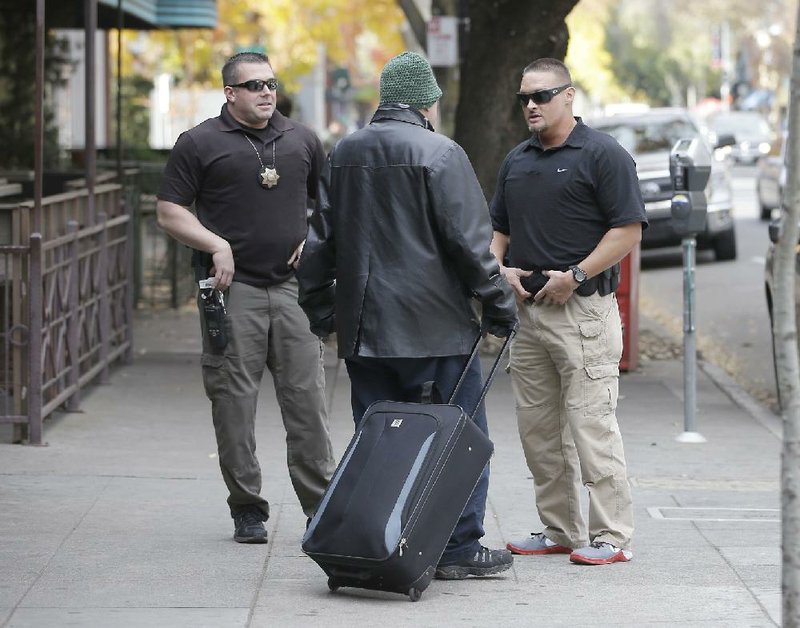SACRAMENTO, Calif. -- Three-quarters of paroled sex offenders in California who were previously banned from living near parks, schools and other places where children congregate now face no housing restrictions after the state changed its policy in response to a court ruling, according to state data.
Corrections officials initially said half the 5,900 parolees are considered child molesters who would still be subject to a ban on where they can live or sleep.
The state's corrections department changed its policy in response to the ruling by the California Supreme Court, which said the prohibition cannot be broadly applied to all offenders.
But data show that 76 percent of offenders are no longer subject to the voter-approved restrictions.
Even some whose offense involved a child no longer face the 2,000-foot residency restriction, officials said. That's because the department's new policy requires a direct connection between where a parolee lives and the offender's crime or potential to re-offend. Offenders whose behavior might be affected by where they live -- such as those who are strangers to their victims -- are rare, officials say.
"A parole agent cannot simply prevent a parolee from living near a school or park because the offender committed a crime against a child," Department of Corrections and Rehabilitation spokesman Jeffrey Callison said in a statement. He said the department reverted to a policy it used before the passage of Jessica's Law, which requires that parole restrictions be related to the crime committed.
The decision largely reverses the blanket housing ban imposed by California voters nine years ago. Many states impose a variety of residency restrictions on sex offenders, though states including Iowa, Georgia and Oklahoma rescinded or changed their residency restrictions, and some now also tailor restrictions to individual sex offenders.
As a result of California's policy change, more than 4,200 of the state's 5,900 offenders no longer qualify for the residency restrictions, according to data compiled by the corrections department at The Associated Press' request. However, the offenders' whereabouts are still monitored with tracking devices, and they must tell law enforcement agencies where they live.
About 20 percent of sex offenders who used to be transient have been able to find permanent housing because they are no longer subject to the rule, the department said.
"These numbers are absolutely astounding," said state Sen. Sharon Runner, who co-wrote the original ballot initiative. "Kids in kindergarten living across the street from a sex offender is not what the people voted for in Jessica's Law. Seventy percent of the people voted to keep them away from schools and parks."
The department spent months reviewing offenders' criminal backgrounds before deciding that the ban should continue to apply to about 1,400 offenders. The department couldn't provide the status of nearly 300 other offenders.
"That's a pretty dramatic reduction in numbers, so that's scary. That's scary for victims," said Nina Salarno, executive director of Crime Victims United of California.
She and Criminal Justice Legal Foundation President Michael Rushford, who represents crime victims, said the department is broadly interpreting the March court ruling, which applied only to San Diego County. Officials have refused to release the legal advice from the state attorney general that they are relying on in making the decision.
In the March ruling, justices found that blanket restrictions violate offenders' constitutional rights by making it difficult for them to find housing and other services and that the ban doesn't advance the state's goal of protecting children. One of the San Diego County offenders sued after he was forced to live in a dry riverbed; two others slept in an alley near the parole office.
Susan Fisher, a board member of the victims support group Citizens Against Homicide, said she was not surprised by the low number of parolees still facing residency restrictions.
Most people think "that around every corner is a child molester," she said. But experts say most child molesters are family members or acquaintances of the victim.
The move to end the blanket housing restriction reflects recommendations that have been made for years by the state's Sex Offender Management Board, an advisory panel made up of law enforcement officials and treatment professionals.
Board Vice Chairman Tom Tobin said California parole officers who are responsible for enforcing the prohibition are now doing a better job of tracking the offenders who have the highest risk of reoffending.
Tobin, a psychologist who also is on the board of the California Coalition on Sexual Offending, said agents can still apply the housing ban when it makes sense. And the department said it still prohibits many offenders from having contact with minors or loitering near parks, schools or other places where children gather.
Tobin and Fisher said the public is safer because more transient sex offenders are now able to find housing.
"If somebody's living under a bridge or going from one house to the next ... we're putting ourselves at greater risk," Fisher said.
Runner disagreed. She said she intends to try again next year to pass stalled legislation that would let judges in each county decide whether the 2,000-foot limit is too restrictive in their jurisdictions.
"Unfortunately, that many people coming from transient to living near schools is not good," Runner said.
A Section on 12/15/2015

